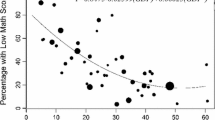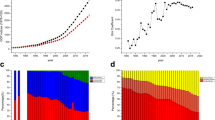Abstract
This article uses the data from the Programme for International Student Assessment (PISA) 2000 to examine whether the influence of family background on educational achievement is sensitive to different measures of the family’s socio-economic status (SES). The study finds that, when a multidimensional measure of SES is used, the family background has a stronger influence on achievement across countries than if the simpler measure of SES is used. The new measure, which incorporated aspects of parental occupation, education and cultural resources, was not biased towards more wealthy nations, Western nations, or urban population. However, when a proxy of wealth was included in the measure of SES, this reduced the other measured effects of family background on achievement in many countries.
Résumé
L’INFLUENCE DE L’ARRIÈRE-PLAN FAMILIAL SUR L’ACCOMPLISSEMENT DE L’ÉTUDIANT : DÉVELOPPER UN SYSTÈME DE MESURE PLUS SENSIBLE - cet article utilise les donnÉes du Programme International pour le Suivi des Acquis des ÉlÈves (PISA) 2000 pour examiner si l’influence de l’arriÈre-plan familial sur l’accomplissement en matiÈre Éducative est sensible aux diffÉrentes mesures du statut socio-Économique de la famille (SSE). L’Étude constate que, lorsqu’on utilise une mesure multidimensionnelle de SSE, l’arriÈre-plan familial a une influence plus forte sur l’accomplissement à travers les pays que si la mesure plus simple du SSE est employÉe. La nouvelle mesure, qui incorporait des aspects du mÉtier parental, de l’Éducation et des ressources culturelles, n’Était pas prÉdisposÉe en faveur des nations plus riches, des nations occidentales, ou de la population urbaine. Cependant, quand une mesure de richesse Était incluse dans les donnÉes, ceci rÉduisait dans beaucoup de pays les autres effets mesurÉs de l’arriÈre-plan familial sur l’accomplissement.
Resumen
LA INFLUENCIA DEL TRANSFONDO FAMILIAR SOBRE EL RENDIMIENTO DE LOS ESTUDIANTES: DESARROLLO DE UN SISTEMA DE EVALUACIÓN MÁS SENSIBLE - Este artículo utiliza los datos del programa internacional de evaluaciÓn de estudiantes (pisa) del año 2000 para comprobar si los valores de influencia del trasfondo familiar cambian con las diferentes formas de medir el status socioeconÓmico (SES). según este estudio, cuando se utiliza una mediciÓn multidimensional del ses, el trasfondo familiar muestra una mayor influencia sobre el rendimiento, a lo largo de los diferentes países, que cuando se aplica una mediciÓn del ses mÁs simple. el nuevo sistema de medida, que ha incorporado aspectos como ocupaciÓn, educaciÓn y nivel cultural de los padres, no beneficia a las naciones con mayor bienestar, ni a las naciones occidentales ni a la poblaciÓn urbana. sin embargo, la inclusiÓn en los datos de una comprobaciÓn del bienestar redujo en muchos países los valores relacionados con los efectos del trasfondo familiar sobre el rendimiento de los estudiantes.
Zusammenfassung
DER EINFLUSS DES FAMILIENHINTERGRUNDS AUF SCHÜLERLEISTUNGEN: ZUR ENTWICKLUNG EINES SENSIBLEREN NOTENSYSTEMS – Der Artikel stÜtzt sich auf Daten aus dem internationalen SchÜlervergleichsprogramm (PISA) 2000 unter der Fragestellung, ob sich der Einfluss des Familienhintergrunds auf die SchÜlerleistungen je nach Messmethode des sozio-ökonomischen Status der Familie (SES) unterschiedlich darstellt. Die Studie kommt zu dem Ergebnis, dass bei Verwendung von multidimensionalen SES-Messungen der Familienhintergrund im Ländervergleich einen stärkeren Einfluss ausÜbt als bei einfacheren SES-Messungen. Die neue Messmethode, die auch den Aspekt der Berufstätigkeit, Bildung und kulturellen Ressourcen der Eltern einbezog, war unvoreingenommen in Bezug auf reichere Nationen, westliche Nationen oder städtische Bevölkerungen. Wurde jedoch eine Wohlstandsmessung in die Daten einbezogen, so reduzierte dies in vielen Ländern die anderen gemessenen Effekte des Familienhintergrunds auf die SchÜlerleistungen.
Similar content being viewed by others
References
Baker David, Goesling Brian, Letendre Gerald 2002. Socioeconomic Status, School Quality, and National Economic Development: A Cross-National Analysis of the “Heyneman-Loxley Effect” on Mathematics and Science Achievement. Comparative Education Review, 46(3): 291–312
Blau Peter, Duncan Otis 1967. The American Occupational Structure. New York: Wiley
Bourdieu Pierre 1977. Cultural Reproduction and Social Reproduction. In: Karabel Jerome, Hasley Albert H. (eds.), Power and Ideology in Education. pp 487–511. New York: Oxford University Press
Bourdieu Pierre 1986. Forms of Capital. In: John G. Richardson (eds.), Handbook of Theory and Research for the Sociology of Education. pp 241–258. New York: Greenwood Press
Braun Michael, Muller Walter 1997. Measurement of Education in Comparative Perspective. In: Mjoset Lars, Engelstad Fredrick (eds.), Methodological Issues in Comparative Social Science. pp 163–201. Greenwich, CT: JAI Press
Buchmann Claudia 2002. Measuring Family Background in International Studies of Education: Conceptual issues and Methodological Challenges. In: Porter Andrew C., Gamoran Adam (eds.), Methodological Advances in Cross-National Surveys of Educational Achievement. pp 150–197. Washington, DC: National Academy Press
Conley Dalton 1999. Being Black, Living in the Red: Race, Wealth, and Social Policy in America. Berkeley: University of California Press
DeGraaf Paul 1986. The Impact of Financial and Cultural Resources on Educational Attainment in the Netherlands. Sociology of Education, 59: 237–246
Filmer, Deon, and Lant Pritchett. 1998. Estimating Wealth Effects without Income or Expenditure data–or Tears: Educational Enrollment in India (World Bank Policy Research Working Paper No.1994). Washington, DC: Development Economics Research Group (DECRG), The World Bank
Filmer Deon, Pritchett Lant 1999. The Effect of Household Wealth on Educational Attainment: Evidence from 35 countries. Population and Development Review, 25(1): 85–120
Fuller Bruce 1987. What School Factors Raise Achievement in the Third World? Review of Educational Research, 57(3): 255–292
Ganzeboom Harry, Treiman Donald 1996. Internationally Comparable Measures of Occupational Status for the 1988 International Standard Classification of Occupations. Social Science Research, 25: 201–239
Heyneman Stephen, Loxley William 1983. The Effect of Primary-School Quality on Academic Achievement across Twenty-Nine High- and Low-Income Countries. American Journal of Sociology, 88(6): 1162–1194
Kerckhoff Alan, Ezell Elizabeth, Brown Scott 2002. Toward an Improved Measure of Educational Attainment in Social Stratification Research. Social Science Research, 31: 99–123
Kingston, Paul. 2001. The Unfulfilled Promise of Cultural Capital Theory. Sociology of Education Extra Issue: 88–99
Kohn Melvin 1989. Class and Conformity: A Study in Values; With a Reassessment, 1977. Chicago: University of Chicago Press
Lareau Annette 2000. Home Advantage: Social Class and Parental Intervention in Elementary Education. Lanham: Rowman & Littlefield Publishers, Inc
Lareau Annette 2003. Unequal Childhoods: Class, Race, and Family Life. Berkeley: University of California Press
Organization for Economic Co-operation and Development. 2002a. Manual for the PISA 2000 Database. Paris: OECD Publications
Organization for Economic Co-operation and Development. 2002b. PISA 2000 Technical Report. Paris: OECD Publications
Organization for Economic Co-operation and Development. 2003. Literacy Skills for the World of Tomorrow: Further Results from PISA 2000. Paris: OECD Publications
Orr Amy 2003. Black-White Differences in Achievement: The Importance of Wealth. Sociology of Education, 76(4): 281–304
Ross Kenneth, Postlethwaite Neville 1989. Indonesia Quality of Basic Education. Djakarta, Indonesia: Ministry of Education and Culture
Sewell William, Hauser Robert 1975. Education, Occupation, and Earnings: Achievement in the Early Career. New York: Academic Press
Treiman Donald 1977. Occupational Prestige in Comparative Perspective. New York: Academic
Wong Raymond 1998. Multidimensional Influences of Family Environment in Education: The Case of Socialist Czechoslovakia. Sociology of Education, 71: 1–22
Author information
Authors and Affiliations
Corresponding author
Rights and permissions
About this article
Cite this article
Nonoyama-Tarumi, Y. Cross-National Estimates of the Effects of Family Background on Student Achievement: A Sensitivity Analysis. Int Rev Educ 54, 57–82 (2008). https://doi.org/10.1007/s11159-007-9069-5
Received:
Accepted:
Published:
Issue Date:
DOI: https://doi.org/10.1007/s11159-007-9069-5




